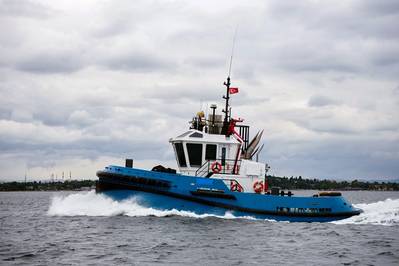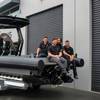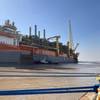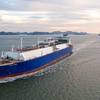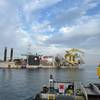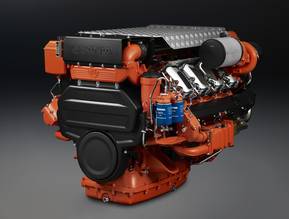Sanmar Delivers Tug to Denmark's Port of Hirtshals
Sanmar Shipyards has delivered a new harbor tug to the Port of Hirtshals in Denmark where it will primarily assist increasingly large ferries to and from the quay in the port’s often notoriously windy conditions.
Formerly part of Sanmar’s own fleet operating at Izmit Bay in Türkiye, the 2019-built tug Yeniçay X has been renamed Sibba by its new owners. It replaces the port’s previous tug which was built in 1979 and has served at Hirtshals since 2005.
Based on the RAscal 1800 design from Canadian naval architects Robert Allan Ltd developed to address the challenges of modern, high-performance Z-drive line-handling, Sibba has a LOA of 18.7m, a moulded beam of 9.2m and depth of 3.5m. It is powered by two Caterpillar C32 main engines, each producing 970 kW at 1.800 rev/min to achieve a bollard pull of 32 tons and a speed ahead of 12 knots.
Port of Hirtshals CEO, Per Holm Norgaard said, “The port’s old tug was not strong enough to cope with the larger ferries now using the port and that this would become more of an issue in future as the port expanded.”
Robert Hanson, Master Mariner and Fleet Manager at Hirtshals, added, “We have scoured the market over the past two years. We are convinced that with SIBBA we have found a tug that suits our needs both today and in the future.”
He also noted that Sibba’s engines met far stricter environmental requirements than its predecessor, resulting in far fewer CO2 emissions.
Ruchan Civgin, Commercial Director of Sanmar Shipyards, said, “I am delighted that the Port of Hirtshals has found the tug that provides the power, strength and performance it requires to meet its individual needs, both now and in the future, at Sanmar. Sibba is one of a proven workhorse range of tugs that can take adverse weather conditions in their stride.”
The RAscal 1800 is a twin Z-drive, diesel powered tug, designed for maximum efficiency in the performance of ship-handling duties for seagoing vessels, based on a wide array of previous successful tug designs, to ensure good sea-keeping, manoeuvrability, and stability in all modes of operation. The vessel is equipped with heavy duty deck equipment and all-round fendering for all ship-handling operations.



